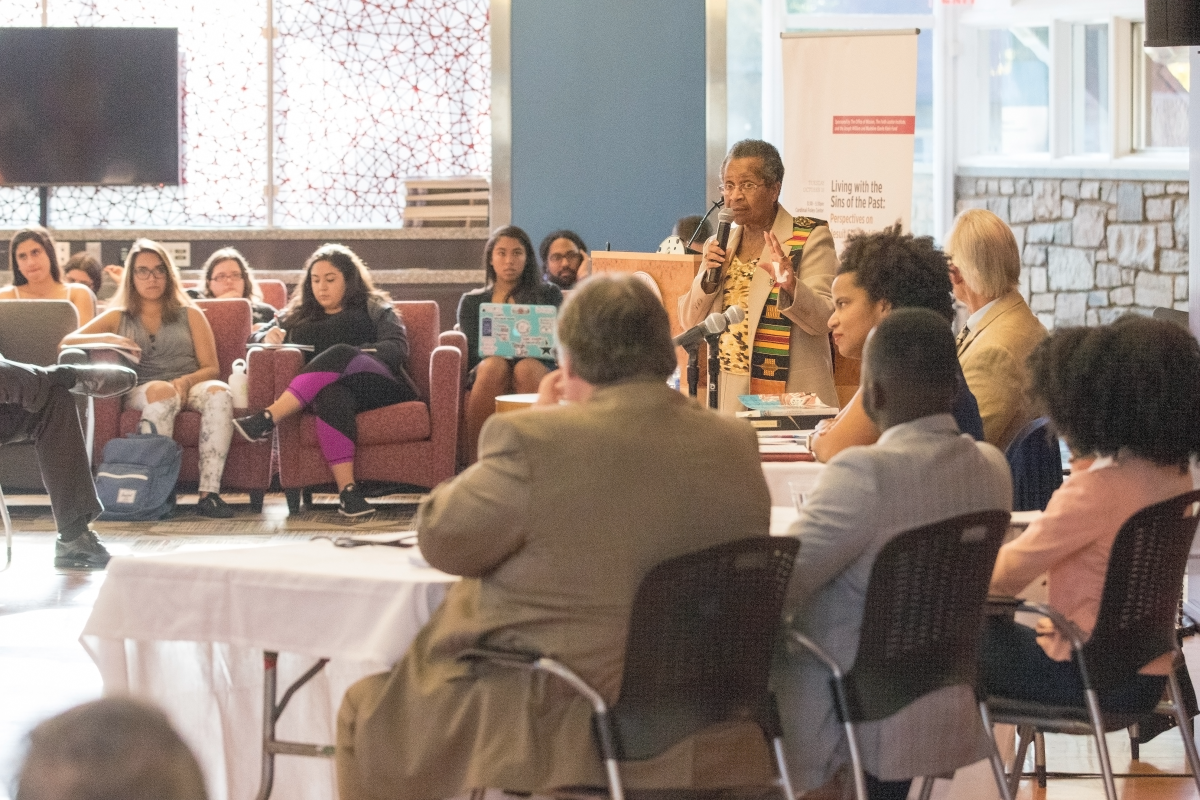St. Joe’s hosts panel on Jesuit slaveholding
A panel held on Oct. 18 titled, “Living with the Sins of the Past: Perspectives of Jesuit Slaveholding,” discussed Maryland Province Jesuits’ public acknowledgement that Jesuits owned and sold slaves in 1838.
Moderated by Dan Joyce, S.J., ’88, executive director of Mission Programs, the panel featured two Saint Joseph’s professors–Tia Pratt, Ph.D., visiting professor of sociology, and Randall Miller, Ph.D., professor of history–and Cora Marie Billings, RSM, former deputy director of the Virginia Human Rights Council.
Joyce opened the panel by discussing how he first learned of the Jesuits’ involvement with the slave trade. During the spring of his freshman year at Saint Joseph’s in 1985, one of Joyce’s history professors mentioned the fact that the Jesuits once owned slaves, something that he, Joyce, found appalling.
“Not only is the reality of slaveholding shocking under any circumstances, but to think that you, or an organization with which you may be associated, has something to do with this history, is disconcerting to say the least,” Joyce said.

Billings began her remarks by pointing out that her great-grandfather was one of the slaves owned by the Maryland Province Jesuits. Despite the fact that the Catholic Church used to own one of her family members, Billings said she is still strong in her faith, because she believes “you can’t change a system if [you] are on the outside.”
She said that while slavery ended more than a hundred years ago, the repercussions of the institution are still very much present in our society.
“You don’t have the shackles of iron you can see… [but] the shackles are still there,” Billings said.
Sociology professor, Pratt, who researches and writes, among other topics, about American Catholicism and race and ethnicity, also brought up the issue of the Catholic Church’s relationship with African American people. She focused her remarks on what Saint Joseph’s University would be doing with the knowledge of their potential connection to the sale of 272 slaves.

“The [Jesuits of the] Maryland Province held men, women, and children in bondage and denied them dignity,” Pratt said, urging the audience to remember that one of the tenets of Jesuit belief is “cura personalis,” or care for the whole person. The Jesuits also urge people to live “with and for others” and show care and respect for all people.
The Jesuits focus heavily on social justice teaching, Pratt said, but sometimes they fail to follow through on their words with actions.
“Social justice teaching must be used to illuminate structural racism and the history that created it,” Pratt said. She called for the university administration to speak out about the institution’s potential connections to slavery, and said that courses about the history of the Jesuits and their slaveholding should, in the future, be included in the core courses St. Joe’s students are required to take.
Joyce later discussed the issue of slavery in America’s history, pointing out that even though we live in “the North,” we still benefitted–mainly financially–from the slave trade.
“Recent historical research that examines closely the financial records of the Anglo-American colonies and the economy of the first half of the 19th century in the United States has demonstrated how integral slaveholding and its profits were for nearly every institution that held assets in that period of time,” Joyce said.
Joyce acknowledged Jesuit slaveholding, and said while Saint Joseph’s is indeed a Jesuit institution, and that we know the Jesuits owned slaves, it is necessary that this potential link is studied in order to find out if and how Saint Joseph’s University fits into the history of the Jesuit legacy of slaveholding.
“It is imperative that we look closely at the realities of our complex history and consider what the direct involvement of Jesuits in slaveholding may mean for us,” he said.

After being introduced by Joyce, Miller discussed the historical context of the Jesuits and their slaveholding practice.While other schools, mainly Ivy League universities, have been exploring their histories and potential connections to slavery for more than 10 years, Miller said Catholic universities, Saint Joseph’s included, have been late to the process.
“We’re now a part of that process,” Miller said. “Even if there’s no direct connection with slavery…there are areas in which Saint Joseph’s University was touched by the profits of slavery and benefitted from various people who made their fortunes or in other ways were involved in slavery.”
Miller pointed out that the Catholic Church never took a stance against slavery, but rather encouraged Catholic masters to baptize and catechize their slaves. However, later on in his remarks Miller stated that, according to historical records, the slaves’ living conditions were “universally unfit for humans to live in” so, despite the fact that the Catholic masters were supposed to treat their slaves well and raise them in the faith, the fact remains that they were still treated inhumanely.
“Being Catholic did not give them [the Jesuits] any reason not to be slaveholders,” Miller said.
The 1838 sale of the 272 Maryland Province slaves was a way, according to Miller, for the Jesuits to “rid themselves of the obligation of slaveholding” yet continue their mission, to plant and build the Catholic Church in the United States.
Pratt made a case for an active and definitive response to the acknowledgement that Jesuits owned and sold slaves.
“We need to do more than have a panel on a Tuesday afternoon,” Pratt said.





































